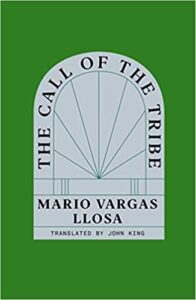Should social scientists read a book on classical liberalism written by a great novelist? Many would be skeptical, assuming that a novelist, no matter how great, can hardly contribute an original perspective on matters concerned with economic and political ideas. Yet in the case of Mario Vargas Llosa they would be wrong, as proved by Javier Fernandez-Lasquetty in a beautiful review for our sister website, Law & Liberty.
Lasquetty is the former Vice President and Dean of the School of Political Studies at Universidad Francisco Marroquin and now the Regional Minister of Economy and Finance of the Madrid Region. The book by Vargas Llosa he is reviewing is The Call of the Tribe, which was just recently translated into English. It is a gallery of portraits of giants in classical liberalism, selected by Vargas Llosa because they influenced him and the making of his own political thought.
This is hardly the first of Vargas Llosa’s perusals in such waters: in 1990, Vargas Llosa run for the presidency in his native Peru (after what seemed a triumphal electoral march, he was defeated in the second round by the then unknown Alberto Fujimori). His political adventure began when he opposed bank nationalisations in the country: a hardly popular cause, particularly these days, but in the late 1980s Peru it sparked a libertarian political movement.
Vargas Llosa’s Peruvian agenda centred upon securing property rights and market freedom for the poor, that he saw as the true losers in a corporatist economy. He authored a long Introduction to Hernando de Soto’s The Otro Sendero. The title was a reference to left-wing terrorists then strong in the country; the book was an analysis of the vibrant informal economy and the failure of ‘official’ institutions to allow people to leverage on it.
Vargas Llosa is certainly the most authoritative voice for classical liberalism in the Spanish speaking world, and the only one among the literati. He has been very generous with his time to classical liberals throughout the world and chairs the Fundacion Internacional Para la Libertad, an umbrella organization of free market think tanks in the Spanish speaking world. The speech he gave when he was awarded the Irving Kristol Award is still a wonderful introduction to his political thought. But his ideas also emerge from a number of articles, essays, as well as from some of his novels. Think only of “The War at the End of the World”, perhaps his masterpiece and the best book to understand Latin American populism.
The Call of the Tribe is a declaration of love to classical liberalism. The only drawback I can find is that it makes the historian of ideas envious, because rarely has the history of ideas been written so beautifully. As Daniel J. Mahoney explains in another thoughtful review for Law & Liberty, the book is modeled upon “To the Finland Station, published in 1940 by the literary critic Edmund Wilson. That book provided an artful (if one-sided) account of the development of European socialism from the nineteenth-century French historian Jules Michelet to Lenin’s terribly consequential arrival at the Finland Station in St. Petersburg in April 1917″.
Writes Lasquetty:
Vargas Llosa also talks to us about the enemies of classical liberalism. The most important is constructivism. It is in his chapter on Hayek where he most emphatically denounces “the fatal desire to organize the life of the community from any center of power.” No less sharply, he rejects that other, much more devious, enemy of classical liberalism: mercantilism. Pointing to Hayek and Adam Smith, he contrasts capitalism with the mercantilist schemes of certain businesspeople and politicians who act to protect themselves from competition by regulations and protectionist politics.
Mario Vargas Llosa’s book is full of joy and optimism. Freedom does not lead to chaos, rather it generates that Hayekian spontaneous order based on free choice and individual responsibility. It is individualism that leads Vargas Llosa to be optimistic, in contrast to the pessimism that Ortega’s mass-man produces and who is merged into a collective being where he surrenders his individuality. For Vargas Llosa, freedom does not exist if it is not comprehensive: there can be no freedom without political freedom, economic freedom, and freedom of creation and thought.
When the book came out in Spanish, I reviewed it, together with Jesse Norman’s book on Adam Smith, in Economic Affairs. This was my take away:
by putting together the authors he picked and by emphasising a common thread that unites them all, Vargas Llosa is pointing to a certain view of liberalism: a liberalism whose lack of faith in interventionism is founded on scepticism towards whatever superior wisdom rulers may boast of; a liberalism that cares for rules of the game that ‘privilege always the consumer over the producer, the producer over the bureaucrat, the individual against the state and the living and real of here and now against that abstraction with which totalitarian thinkers justify all their violence: future humanity’ (p. 111).
This liberalism looks not unlike a philosophy for the common man in commercial societies. It stresses the long-term benefits of ‘market-tested betterment’ (to borrow McCloskey’s phrase), believes in progress when it comes to practical matters, that is, contrivances of human ingenuity, but is weary of it when it comes to great political schemes; it supports ‘spontaneous orders’ because it maintains that history is a never-ending quest. This is a liberalism strongly concerned with spreading prosperity all the more as the working classes are those who, in the long run, will benefit the most.
Such liberalism looks at history as a product of evolution, of human actions and unintended consequences, indeed as Smith did. It is therefore not surprising, though it would please the Smith student, that Vargas Llosa’s book was planned as an essay that, ‘starting in the small Scottish village of Kirkcaldy with the birth of Adam Smith in 1723, will describe the evolution of liberal ideas by their most relevant exponents’ (p. 11).



READER COMMENTS
Rebes
Mar 18 2023 at 12:06am
Wonderful book. Hope it will be read by many.
Comments are closed.